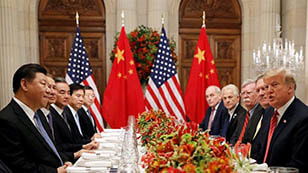WASHINGTON - China has agreed to cut tariffs on cars it imports from the US, President Donald Trump has said, after he negotiated a truce in the trade war with Beijing. The announcement boosted the financial markets. "China has agreed to reduce and remove tariffs on cars coming into China from the US. Currently the tariff is 40 per cent," Trump tweeted on Sunday. The outcome of the Trump-Xi meeting boosted financial markets in Asia Pacific on Monday.

The benchmark Shanghai Composite index led the way with a rise of 2.57 per cent while Hong Kong was up 2.45 per cent and Tokyo closed 1 per cent better off. Australia's benchmark ASX200 index finished the day up 1.84 per cent. The increases paved the way for sharp rises on European and US exchanges later in the day with futures trade seeing the FTSE100 opening up by 1.6 per cent and the Dow Jones industrial average on Wall Street expected to leap 2 per cent.
But Trump didn't give details about the car tariffs or when the change would happen and what the new tariff level would be, CNN reported. There was no immediate response from the Chinese government on cutting car tariffs.
Trump's announcement came shortly after he and his Chinese counterpart Xi Jinping announced a breakthrough during the G-20 summit in Buenos Aires on Saturday, temporarily pausing the trade row between the world's two largest economies that saw tit-for-tat tariffs imposed on each other's products. Neither country had mentioned the car tariff issue in their official read-outs of the Trump-Xi weekend meeting in which Washington agreed to hold off on his threat to impose 25 per cent tariffs on $200 billion worth of Chinese goods from January 1, leaving them at the current 10 per cent rate.
In return, Beijing agreed to purchase more agricultural products from US farmers immediately.
Earlier this year, China lowered its tariffs on foreign car imports from 25 per cent to 15 per cent. However, it later imposed new additional tariffs of 25 per cent on American-made passenger vehicles after Trump raised the tariff on Chinese autos from 2.5 to 27.5 per cent. The US leader called his deal with Xi "incredible". "It goes down, certainly - if it happens, it goes down as one of the largest deals ever made," he told reporters. Meanwhile, the Chinese state media warned that while the new "consensus" was a welcome development and gave both sides "breathing space" to resolve their differences, there was no "magic wand" that would allow the grievances to disappear immediately. "Given the complexity of interactions between the two economies, the rest of the world will still be holding its collective breath," said the official China Daily in an editorial.
But Trump didn't give details about the car tariffs or when the change would happen and what the new tariff level would be, CNN reported. There was no immediate response from the Chinese government on cutting car tariffs.
Trump's announcement came shortly after he and his Chinese counterpart Xi Jinping announced a breakthrough during the G-20 summit in Buenos Aires on Saturday, temporarily pausing the trade row between the world's two largest economies that saw tit-for-tat tariffs imposed on each other's products. Neither country had mentioned the car tariff issue in their official read-outs of the Trump-Xi weekend meeting in which Washington agreed to hold off on his threat to impose 25 per cent tariffs on $200 billion worth of Chinese goods from January 1, leaving them at the current 10 per cent rate.
In return, Beijing agreed to purchase more agricultural products from US farmers immediately.
Earlier this year, China lowered its tariffs on foreign car imports from 25 per cent to 15 per cent. However, it later imposed new additional tariffs of 25 per cent on American-made passenger vehicles after Trump raised the tariff on Chinese autos from 2.5 to 27.5 per cent. The US leader called his deal with Xi "incredible". "It goes down, certainly - if it happens, it goes down as one of the largest deals ever made," he told reporters. Meanwhile, the Chinese state media warned that while the new "consensus" was a welcome development and gave both sides "breathing space" to resolve their differences, there was no "magic wand" that would allow the grievances to disappear immediately. "Given the complexity of interactions between the two economies, the rest of the world will still be holding its collective breath," said the official China Daily in an editorial.

 RSS Feed
RSS Feed
